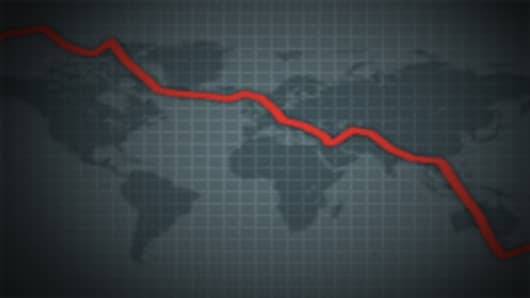Both the United States and Europe are on recession watch, and investors should not be fooled by the occasional piece of positive economic data, according to two leading economists.
“For the U.S, we now expect GDP growth in the second half of 2011 to average just 1.3 percent at an annual rate, down from 2.8 percent,” said HSBC Chief US Economist Kevin Logan in a research note.
“Don’t be fooled by an autos recovery in the third quarter,” said Logan Jonathan Loynes, the chief European economist at Capital Economics, feels similarly about Europe.
“The latest activity indicators suggest that the euro-zone economy might soon slip back into recession.
In the second quarter, the economy expanded by just 0.2 percent, compared to 0.8 percent in the first quarter of 2011,” said Loynes.
“Growth this weak means the economy will likely remain on recession watch throughout the remainder of this year,” Logan said of the U.S. He believes the key risk is stagnating consumer spending.
“Even if a recession is avoided, we continue to see a number of structural forces that will weigh on the economy next year.
Housing conditions remain in deep freeze, with a large inventory of homes for sale depressing prices.
Another constraint on growth relates to the ongoing efforts by households to repair their balance sheets,” said Logan.
Some, such as Chicago Federal Reserve President Charles Evans, say the US economy is so weak it feels like a recession, as he outlined during a speech in London on Wednesday evening.
"Conditions still aren't much different from an economy still in recession,” said Evans .
With non-farm payrolls in the U.S. flat in August, Logan believes the Fed will act sooner rather than later.
“Faced with these conditions, no one should be surprised if the FOMC chooses to adopt additional unconventional easing measures at the upcoming policy meeting on 20/21 September,” said Logan.
The market will be watching the European Central Bank and Bank of England very closely on Thursday afternoon for clues on whether they will do the same thing as many predict the U.S. Federal Reserve will do later this month; that is, take unconventional measures to pump more money into the economy.
“Worryingly, the recent deterioration in sentiment has been related more to developments in the core economies than in the periphery.
The German Ifo survey of business expectations fell particularly sharply in August, adding to evidence that even the German recovery has faltered.”



